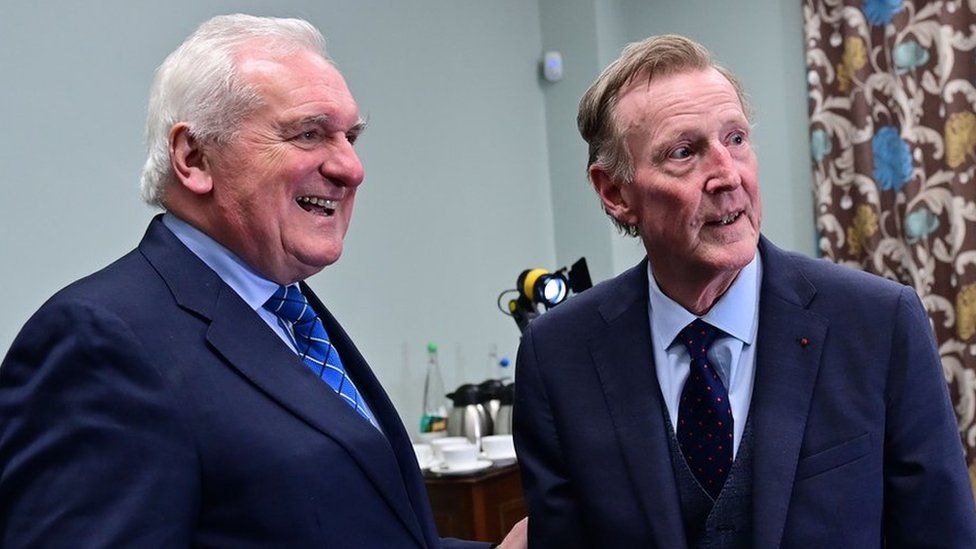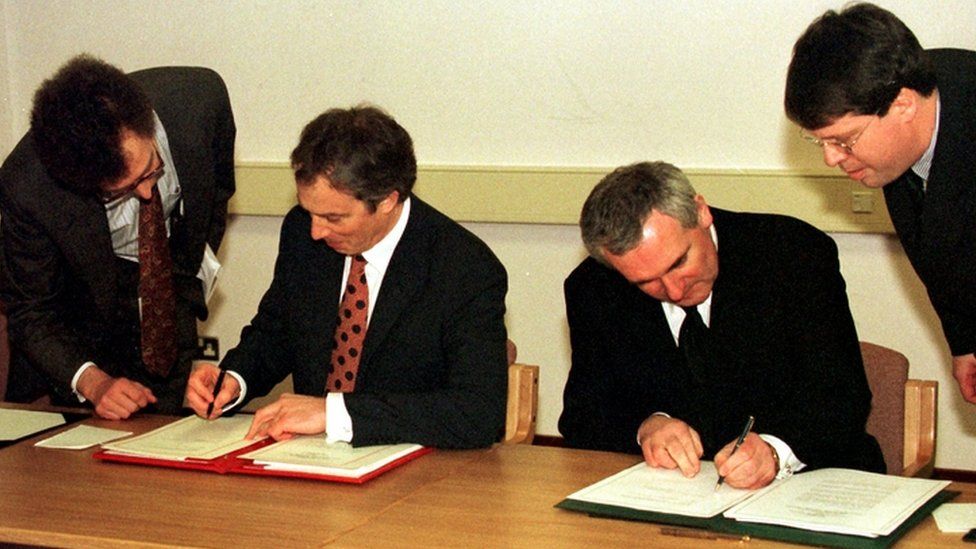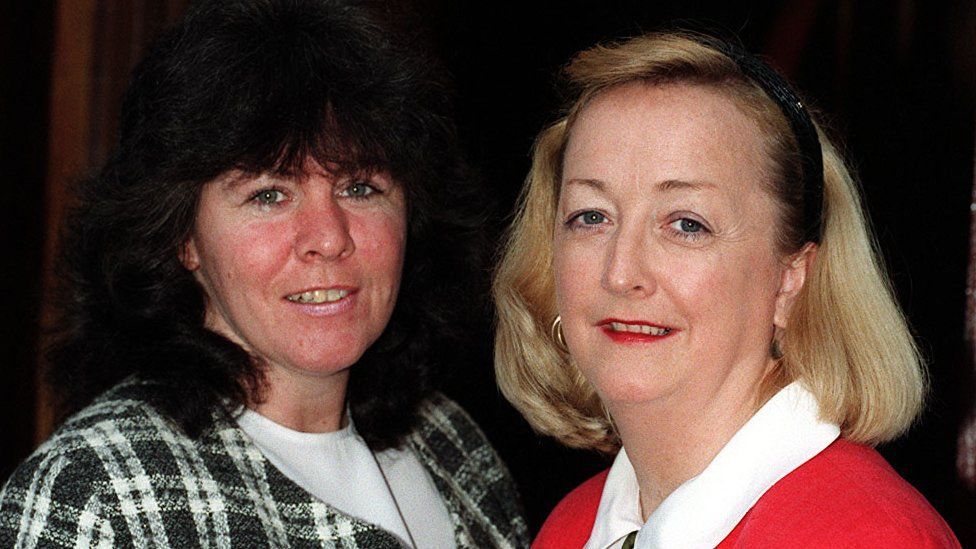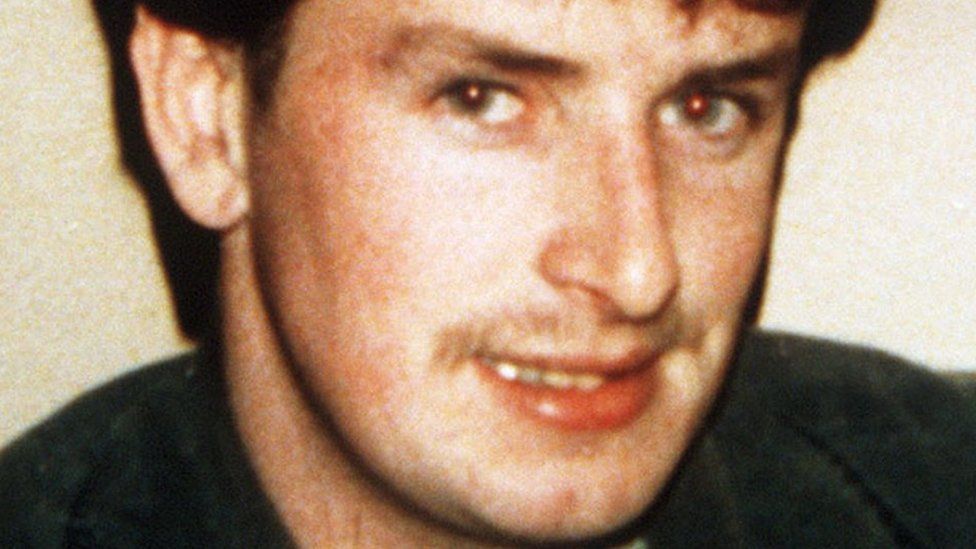Irish state papers from 1997 and 1998 detail the Republic of Ireland’s arms crisis in the 1970s.
 Image source, Pacemaker
Image source, PacemakerThe then taoiseach (Irish prime minister) Bertie Ahern turned down a request from David Trimble for an inquiry into the 1970 arms crisis in the Republic of Ireland.
It is one of the details in Irish state papers from 1997 and 1998 released by the National Archives of Ireland (NAI).
The late Lord Trimble was then the Ulster Unionist Party leader.
He had sought the inquiry after the UK government gave the go-ahead for a new Bloody Sunday inquiry in 1998.
The files released by the NAI also chart the actions and attitudes of the Irish government in the run up to the Good Friday Agreement.
In May 1970, Neil Blaney and Charles Haughey were sacked as cabinet ministers by taoiseach Jack Lynch for their alleged involvement in illegal attempts to import guns into the Republic of Ireland.
Mr Blaney and Mr Haughey were eventually arrested and “charged with conspiring to import arms illegally into the state” but were not convicted.
According to the Irish files, Lord Trimble responded to then-UK prime minister Tony Blair’s announcement in January 1998 of a new Bloody Sunday inquiry by seeking a quid pro quo from the Irish government of an inquiry into the 1970 arms crisis.
But that was rejected by taoiseach Bertie Ahern on the grounds that the Irish government saw no equivalence between the two events.
“Bloody Sunday was different because, not only did the victims of Bloody Sunday suffer their fate at the hands of those whose duty it was to respect as well as uphold the rule of law, but they also suffered the additional injustice of the Widgery Report,” an Irish paper noted.
Furthermore, the file continued, Ahern’s predecessor in 1970, Jack Lynch, “far from covering up” the arms crisis, “exposed the facts of the case in the most public way possible”.
A subsequent criminal trial and investigation by the Dáil’s (Irish parliament) public accounts committee were deemed sufficient, and in light of the Irish government’s anti-terrorist stance, Ahern did not “see that any useful purpose would be served by establishing or re-opening” any inquiry into the arms crisis.
There are also extensive files on the Irish government’s interactions with British officials and Northern Irish political parties, between the election of the new Labour government in Britain in May 1997 and the conclusion of the Good Friday Agreement in April 1998.
Initial meetings between the officials of the new British government and their Irish counterparts were not always smooth.
The Irish “took particular exception to the suggestion that Articles 2 and 3 of the [Irish] Constitution might be altered as a confidence-building measure in advance of a settlement”.
The articles, which originally claimed that “the national territory consists of the whole island of Ireland”, were eventually amended as part of the Good Friday Agreement.

The priority for both governments in late spring and early summer 1997 was restoring the IRA ceasefire.
The IRA’s 1994 ceasefire had ended in 1996 with the Docklands bomb in London which killed two men and caused extensive damage.
In a meeting with Irish government representatives on 17 May 1997, Sinn Féin were reported to have shown “an encouraging awareness of the need for rapid progress in this respect”.
In one of the first substantive meetings between Sinn Féin and the new British Labour government, three weeks after the UK general election, Sinn Féin made a formal presentation to the British side in which they “emphasised their desire to do serious business”.
Their acceptance “that they shared responsibility for resolving conflict in Ireland” and determination to “achieve peace” made a “very positive impression” with the British, according to the Irish files.
These moves, and a change of government in the Republic with the election of a Fianna Fáil-led government in June, eventually led to the restoration of the IRA ceasefire on 20 July 1997.
Two bulky files from the Department of An Taoiseach entitled Talks Process provide summaries of each day of negotiations leading up to the Good Friday Agreement.
A proposal from the Women’s Coalition for “a second chamber” at Stormont, “made up of representatives of civil society”, was said to have “received little support”.

Image source, Pacemaker
The Irish also reported divisions within the UUP delegation on reform of policing.
Ken Maginnis “rejected any suggestion of a change of name”, but Reg Empey “recognised the difficulties which existed in the nationalist community in relation to the RUC”.
The desire for policing reform was not a nationalist preserve and was supported from the leaders of the fringe loyalist parties, David Ervine and Gary McMichael – according to Irish officials – because of “the alienation from the RUC which exists within working class Protestant communities”.
A bi-lateral or multi-lateral format for the negotiations, rather than a round-table approach that involved all parties, was seen as the best option for reaching agreement.
‘Sustained sniping’
During the inclusive sessions the “sustained sniping between a number of delegations and unproductive exchanges” had hampered progress.
Legacy issues also feature in the files.
As well as Mr Trimble’s request for an inquiry into the 1970 arms crisis, another file covering a 10-year span between 1988 and 1998 contains details of contacts between the Irish government and the family of Aidan McAnespie.

Mr McAnespie, 23, was hit in the back by a bullet as he walked through an army checkpoint at a border crossing in Tyrone in 1988.
In November 2022, former soldier David Holden was found guilty of Mr McAnespie’s manslaughter.